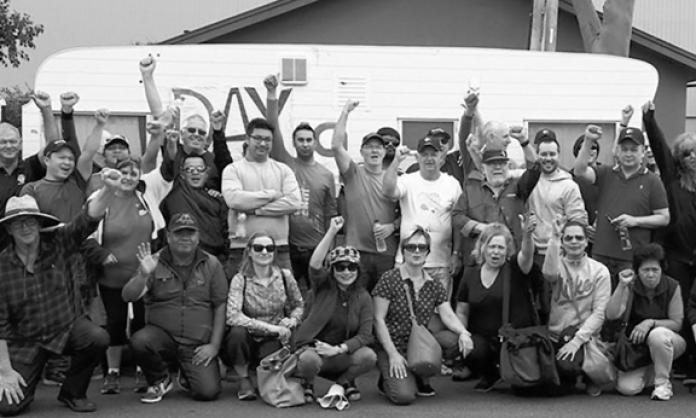A modest industrial dispute in the northern suburbs of Melbourne has become the latest flashpoint in the battle for the right to strike. Around 90 envelope production workers at the Australian Paper site in Preston – who have been out the gate since 16 January – were ordered back to work by the Fair Work Commission on 16 February.
Their union, the Australian Manufacturing Workers’ Union, has obtained a stay on the decision while an appeal is heard. However, coming just weeks after a blanket strike ban was imposed on NSW rail workers, the commission’s return to work order peels another layer off the facade that Australian workers have a legal right to strike.
In her reasons, commissioner McKinnon found that the company’s refusal to bargain “while stoppages are on foot”, justified a decision to send the workers back into the factory. In response, the union pointed out the obvious: if the company’s case is that its own obstinacy is blocking bargaining, then directing the workers back to work is a reward for belligerence.
But the logic of such a move was clear to commissioner McKinnon, one of three recent Michaelia Cash appointees to the national industrial tribunal. Having previously held positions at the Farmers’ Federation and within the federal Employment Department, McKinnon counts among her backers numerous prominent anti-worker zealots within government, including Eric Abetz.
While the union’s lawyers have mounted an appeal against the decision, describing the company’s application to suspend industrial action as a “prime example of how [the Fair Work Act] can be abused by an employer”, the workers are carrying on their strike action.
This group of workers doesn’t think the Fair Work Commission is there to do them any favours. “We haven’t heard anything from the commissioners”, said Robert, one of the AMWU members Red Flag spoke to on the picket line. Kristina, another worker, said that the company’s insistence on bringing the commission in shows that it’s still not serious about a settlement.
More than six weeks in, the 90 unionists on strike at Australian Paper understand that this dispute is about industrial muscle and will be lost by whichever side buckles first. The workers are adamant it won’t be them. “We’re beyond angry”, Robert said. “We’ve been angry since the beginning of the year.”
At issue are three simple things: the workers want a 2.5 percent annual wage rise and for the company to drop its proposals to cut their rostered days off and introduce grandfathered wage increases – a strategy to freeze the wages of some until others “catch up”. On the picket line, there’s a sense that the company has crossed a line. If it can force through its claims, these workers know that they’ll always be on the back foot. “Today, they just want to screw you down everywhere; they always want to take more from you”, Kristina said.
Right now is crunch time. The striking workforce has stuck out the strike to get to a point where the company is feeling real pressure. Only now is the warehouse empty of stock and the company struggling to supply its customers, including government departments, major banks and Officeworks.
For Australian Paper, this is the reason the commission must intervene on its side. In arguments at the tribunal, its lawyers claimed that the strike must end because the company can’t focus on reaching agreement while it’s “managing efforts to mitigate the effect of the action … on its ability to meet customer demands”. For the workers, this is the point of the strike. “For 10 months they did nothing, until we came out here”, Robert said.
It seems harder to hold your ground these days, both Robert and Kristina agree. No one at this factory has been out on strike for this long before. But there’s no question they know what it will take to win. “We are strong and united, and we won’t back down or give in”, said Kristina.











